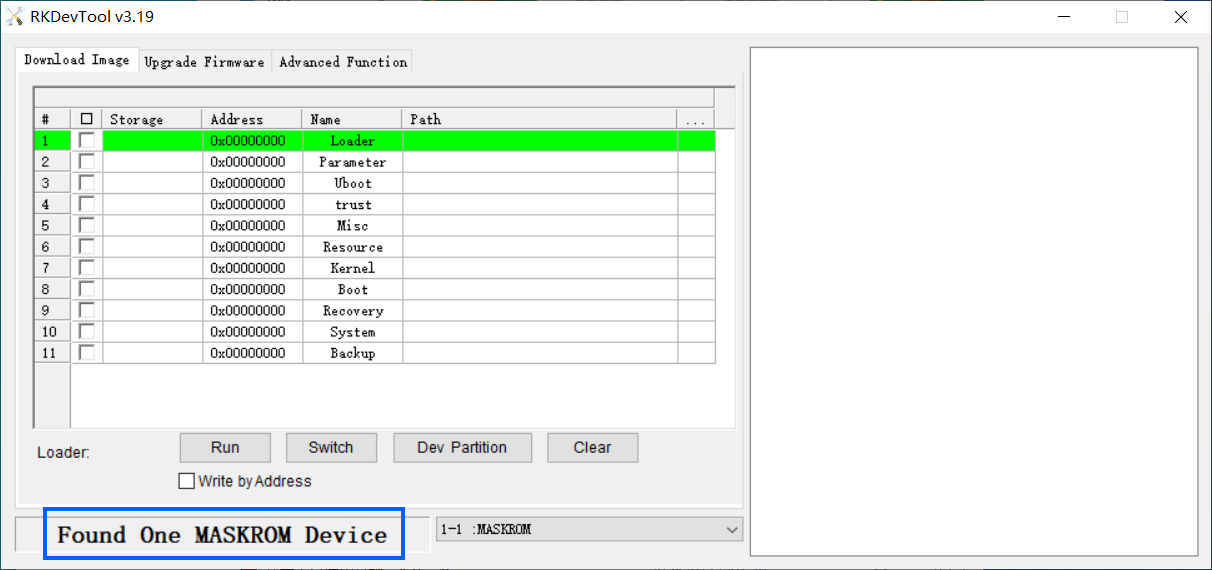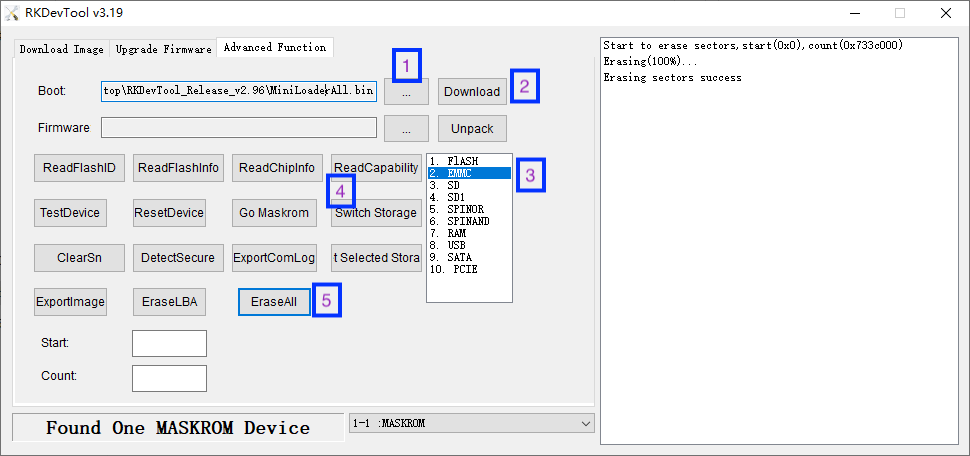Difference between revisions of "Template:RockchipUnbrick"
From FriendlyELEC WiKi
(updated by API) |
(updated by API) |
||
| Line 1: | Line 1: | ||
| − | + | == Unbricking Method == | |
If the ROM is not installed correctly, causing the development board to become bricked, and you might not have the opportunity to reinstall the ROM via an SD card, you need to enter Maskrom mode to unbrick it by erasing the storage device.<br> | If the ROM is not installed correctly, causing the development board to become bricked, and you might not have the opportunity to reinstall the ROM via an SD card, you need to enter Maskrom mode to unbrick it by erasing the storage device.<br> | ||
The following steps are currently only applicable to Windows systems.<br> | The following steps are currently only applicable to Windows systems.<br> | ||
| − | + | === Download Required Files === | |
* '''Get the necessary tools''': Visit [https://dl.friendlyelec.com/{{{1}}} here], find '''RKDevTool_v3.19_for_window.zip''' and '''DriverAssitant_v5.1.1.zip''' in the '''05_Tools''' directory, and download them to your local machine. | * '''Get the necessary tools''': Visit [https://dl.friendlyelec.com/{{{1}}} here], find '''RKDevTool_v3.19_for_window.zip''' and '''DriverAssitant_v5.1.1.zip''' in the '''05_Tools''' directory, and download them to your local machine. | ||
* '''Install Rockchip USB driver and RKDevTool''': Extract '''DriverAssitant_v5.1.1.zip''' to install the Rockchip USB driver, and extract '''RKDevTool_v3.19_for_window.zip''' to obtain the Rockchip flashing tool '''RKDevTool'''. | * '''Install Rockchip USB driver and RKDevTool''': Extract '''DriverAssitant_v5.1.1.zip''' to install the Rockchip USB driver, and extract '''RKDevTool_v3.19_for_window.zip''' to obtain the Rockchip flashing tool '''RKDevTool'''. | ||
* '''Get the loader''': Visit [http://112.124.9.243/dvdfiles/ here], enter the tools directory corresponding to your CPU model, and download '''MiniLoaderAll.bin'''. | * '''Get the loader''': Visit [http://112.124.9.243/dvdfiles/ here], enter the tools directory corresponding to your CPU model, and download '''MiniLoaderAll.bin'''. | ||
| − | + | === Enter Maskrom Mode to Erase the Storage Device === | |
* Connect {{{1}}} to your computer using a USB data cable. | * Connect {{{1}}} to your computer using a USB data cable. | ||
* Start '''RKDevTool''' on your computer. | * Start '''RKDevTool''' on your computer. | ||
Revision as of 09:09, 4 June 2024
1 Unbricking Method
If the ROM is not installed correctly, causing the development board to become bricked, and you might not have the opportunity to reinstall the ROM via an SD card, you need to enter Maskrom mode to unbrick it by erasing the storage device.
The following steps are currently only applicable to Windows systems.
1.1 Download Required Files
- Get the necessary tools: Visit here, find RKDevTool_v3.19_for_window.zip and DriverAssitant_v5.1.1.zip in the 05_Tools directory, and download them to your local machine.
- Install Rockchip USB driver and RKDevTool: Extract DriverAssitant_v5.1.1.zip to install the Rockchip USB driver, and extract RKDevTool_v3.19_for_window.zip to obtain the Rockchip flashing tool RKDevTool.
- Get the loader: Visit here, enter the tools directory corresponding to your CPU model, and download MiniLoaderAll.bin.
1.2 Enter Maskrom Mode to Erase the Storage Device
- Connect {{{1}}} to your computer using a USB data cable.
- Start RKDevTool on your computer.
- Disconnect the power from {{{1}}}, hold down the MASK button, connect the power, and release the button when you see Found One MASKROM Device displayed at the bottom of the interface, as shown below:
- Click the Advanced Function tab in the RKDevTool interface.
- In the Boot text box, select MiniLoaderAll.bin, then click the Download button.
- Select EMMC, click Switch Storage, then click the EraseAll button to erase the eMMC.
- At this point, {{{1}}} is restored to its initial state and can be normally booted via SD card or eMMC.

